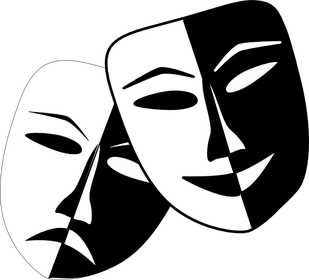A Free Short Guide for Understanding the Causes of Depression and Negative Feelings
Happy Healthy Suffering is a mini zine that explores what causes depression and other forms of mental suffering. It is written from chapters 4 and 5 of The Happiest Choice: Essential Tools for Everyone's Brain Feelings.



 Physical copies are available to purchase on the Rad Cat Press Etsy store.
Physical copies are available to purchase on the Rad Cat Press Etsy store.
Transcription
Introduction
Over the course of a lifetime, mental suffering, depression, and anxiety impacts everyone. They are rampant conditions that are partially biological but largely cultural and an outcome of the society we live in. An important aspect of addressing depression and anxiety correctly is understanding what causes it uniquely in each individual.
This guide is derived from chapters 4 and 5 of The Happiest Choice: Essential Tools for Everyone's Brain Feelings. You can learn more about my book and the science of happiness at www.sageliskey.com
Please note that while the information contained herein is researched and has worked for me, I am not a medical professional and none of this is meant to be medical advice. As such I do not guarantee the accuracy of the information presented and disclaim liability for errors and omissions.
What is Depression?
Clinically speaking depression involves having a certain number of mental and physical symptoms for over 2 weeks. These include feeling sad, being hopeless, anxious, irritable, or guilty, losing interest in a favorite activity, feeling tired, having trouble concentrating, overeating or lacking an appetite, sleeping too much or too little, having thoughts of suicide or suicide attempts, and aches or pains, headaches, cramps, or digestive problems.
In general, depression is simply an extended state of mental suffering caused by “potentials” and “triggers.” “Potentials” increase the likelihood of experiencing depression, and “triggers” put a person into a mental state of suffering.
Potentials
Chemical Abnormalities
hormones, genes, nutrient processing, chemical processing, medications
Life Events
trauma, childhood events, growing up poor, discrimination, exposure to certain harmful chemicals, cultural upbringing
Lifestyle Choices
food, exercise, nutrition, environment, thinking patterns, communication style
Unmet Needs
sustenance, safety, love, empathy, recreation and play, community, creativity, autonomy, and purpose
Triggers
Anything can trigger depression or a mental state of suffering, but some triggers are more common than others such as:
Stress or stressful events, lack of sleep, thoughts, under or over consuming food, consumption of certain substances, media, loneliness, staying inside, withdrawal symptoms, an inability to cope with societal pressures, or expectations that a culture places on members of that culture.
A “potential” can act as a “trigger” with factors like sleeplessness and malnourishment.
My Mind
Adapted from the Icarus Project's 'Mad Map.' Use this template to record your “Potentials,” your “Triggers,” things that make you feel better, and people who can support you when you're having a rough time.
My Potentials
My Triggers
Things That Make Me Feel Better
People Who Can Support Me During An Unhappy Time
On Western Medicine
Medication is the best answer to some forms of mental suffering and help many people cope. Discretion needs to be used however as unlike what many doctors and pharmaceutical companies say, is not always the solution nor is it always safe to consume. Antidepressants can worsen symptoms and in some people simply have a placebo effect. When doctors are prescribing antidepressants they rarely test for the specific chemical or genetic abnormality causing a person's depression or anxiety and instead use a “guess and check” method for prescription. Doctors also tend to ignore the possibilities of nutrient deficiencies, trauma, diet, sleeplessness, lack of exercise, environment, chemical exposure, and so forth. Medication can be healing, just know your options and practice good self-care!




 Physical copies are available to purchase on the Rad Cat Press Etsy store.
Physical copies are available to purchase on the Rad Cat Press Etsy store.Transcription
Introduction
Over the course of a lifetime, mental suffering, depression, and anxiety impacts everyone. They are rampant conditions that are partially biological but largely cultural and an outcome of the society we live in. An important aspect of addressing depression and anxiety correctly is understanding what causes it uniquely in each individual.
This guide is derived from chapters 4 and 5 of The Happiest Choice: Essential Tools for Everyone's Brain Feelings. You can learn more about my book and the science of happiness at www.sageliskey.com
Please note that while the information contained herein is researched and has worked for me, I am not a medical professional and none of this is meant to be medical advice. As such I do not guarantee the accuracy of the information presented and disclaim liability for errors and omissions.
What is Depression?
Clinically speaking depression involves having a certain number of mental and physical symptoms for over 2 weeks. These include feeling sad, being hopeless, anxious, irritable, or guilty, losing interest in a favorite activity, feeling tired, having trouble concentrating, overeating or lacking an appetite, sleeping too much or too little, having thoughts of suicide or suicide attempts, and aches or pains, headaches, cramps, or digestive problems.
In general, depression is simply an extended state of mental suffering caused by “potentials” and “triggers.” “Potentials” increase the likelihood of experiencing depression, and “triggers” put a person into a mental state of suffering.
Potentials
Chemical Abnormalities
hormones, genes, nutrient processing, chemical processing, medications
Life Events
trauma, childhood events, growing up poor, discrimination, exposure to certain harmful chemicals, cultural upbringing
Lifestyle Choices
food, exercise, nutrition, environment, thinking patterns, communication style
Unmet Needs
sustenance, safety, love, empathy, recreation and play, community, creativity, autonomy, and purpose
Triggers
Anything can trigger depression or a mental state of suffering, but some triggers are more common than others such as:
Stress or stressful events, lack of sleep, thoughts, under or over consuming food, consumption of certain substances, media, loneliness, staying inside, withdrawal symptoms, an inability to cope with societal pressures, or expectations that a culture places on members of that culture.
A “potential” can act as a “trigger” with factors like sleeplessness and malnourishment.
My Mind
Adapted from the Icarus Project's 'Mad Map.' Use this template to record your “Potentials,” your “Triggers,” things that make you feel better, and people who can support you when you're having a rough time.
My Potentials
My Triggers
Things That Make Me Feel Better
People Who Can Support Me During An Unhappy Time
On Western Medicine
Medication is the best answer to some forms of mental suffering and help many people cope. Discretion needs to be used however as unlike what many doctors and pharmaceutical companies say, is not always the solution nor is it always safe to consume. Antidepressants can worsen symptoms and in some people simply have a placebo effect. When doctors are prescribing antidepressants they rarely test for the specific chemical or genetic abnormality causing a person's depression or anxiety and instead use a “guess and check” method for prescription. Doctors also tend to ignore the possibilities of nutrient deficiencies, trauma, diet, sleeplessness, lack of exercise, environment, chemical exposure, and so forth. Medication can be healing, just know your options and practice good self-care!

Published on September 25, 2017 12:53
No comments have been added yet.



